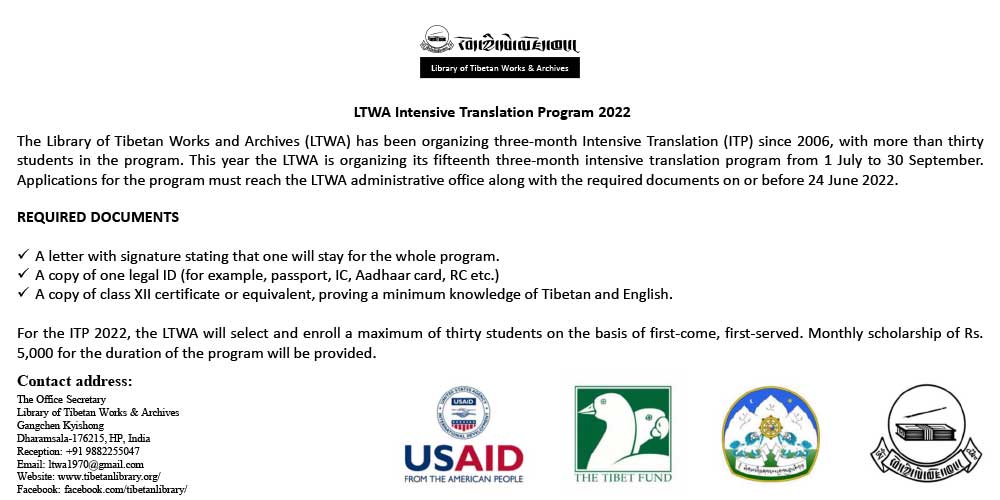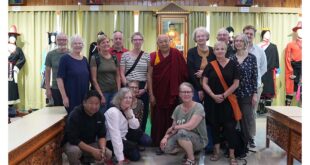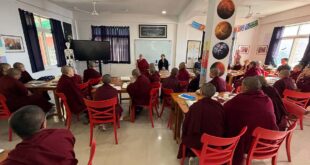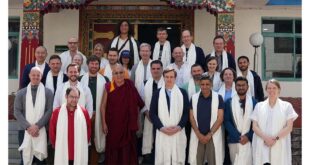TRANSLATION WORKSHOP
The Library of Tibetan Works & Archives
The Library of Tibetan Works and Archives (LTWA), Dharamsala will organize a three-month translation workshop from 1 July to 30 September 2022. The workshop will exclusively cover various methods and practices adopted in the translation of Buddhist teachings and scriptures.
1. HISTORICAL BACKGROUND
Through the ages, translation, a simple yet complicated process of rendering a piece of information from its language of origin into the expression of a different culture, has proven the greatest force behind constructive interaction among humankind. Translation has enabled the sharing and exchanging of knowledge on religion, culture, science, technology, education, traditions, arts and so forth among people of different cultural and environmental backgrounds. For the Tibetans, translation ushered in a golden era as it facilitated the advent of Buddhism in Tibet from India in the late seventh century.
Today, Tibet’s identity is largely characterized by the principles and values enshrined in the innumerable ancient Buddhist scriptures that have been translated from the languages of India and other countries. Though its history is brief compared to other ancient countries, Tibet has witnessed one of the highest rates of Buddhist translation in this world both in quality and quantity. The superior quality of translations of works by the great scholars motivated solely by the intention to benefit others continued for hundreds of years under the patronage of the Tibetan kings and the successive ecclesiastical and lay rulers.
However, the Chinese invasion and its occupation of Tibet in 1959 resulted in the mass killing of Tibetans, including monks and nuns, and vast destruction of temples and monasteries. The infamous decade-long Chinese “Cultural Revolution” (1966-77) and the subsequent repressive policies instituted by the Chinese government further intensified religious and cultural persecution, ravaging much of the priceless Tibetan literary, religious and cultural wealth. The illegal occupation forced Tibet’s spiritual and temporal leader, His Holiness the Dalai Lama, and thousands of Tibetan to flee into exile and seek asylum in India and elsewhere.
Today, despite all adversaries, His Holiness the Dalai Lama and the Central Tibetan Administration (Tibetan Government-in-exile), with generous support from India and other countries, have taken tremendous strides towards rebuilding the ancient monasteries and cultural institutions and opening new schools for the teaching of modern subjects. This effort has led to the establishment of many cultural centers, including one of the oldest: the Library of Tibetan Works and Archives in Dharamsala in the north of India.
Founded in 1971, the LTWA was formally recognized as a “Centre for Tibetan Studies” by the Himachal Pradesh University and as a “National Library” “National Archive” and “National Museum” by the Tibetan Parliament-in-exile on 9 February 1996. With an extensive library facility aided by several departments, including the Department of Research and Translation, the LTWA functions as an academic centre for the study of Buddhism and Tibetan Studies.
2. AIMS AND OBJECTIVES
In the wake of the new millennium and the ongoing struggle for Tibet’s freedom, Tibetans today stand face to face with two major challenges: firstly, to sustain their unique identity through the preservation of their distinct culture and religion, and secondly to begin to embrace modern science and technology and seek to excel in them for the betterment of Tibet and the world. In view of these challenges, His Holiness the Dalai Lama and the Tibetan Government-in-exile have worked tirelessly towards the rebuilding of monasteries and centers for cultural education, and the opening of new schools for teaching modern subjects including science and technology over the past four decades in exile.
These two challenges further spur the need for the production of translations to enable the dissemination of Tibet’s ancient spiritual culture to the materialistically advanced West and the assimilation of Western knowledge of modern science and technology to further Tibetans’ spiritual richness. This could well yield an unprecedented growth of literary works to add to the already vast Tibetan literary collections. This will significantly help to ensure the intellectual growth of a nation.
In light of these pressing needs, the LTWA is organizing a three-month workshop.
3. WORKSHOP PROGRAMS AND ACTIVITIES
The workshop shall be conducted for a period of three months from 1 July to 30 September 2022. However, classes shall not be held on Sundays, on Saturdays except its first Saturday of month, on Tibetan national holidays and during His Holiness’ teachings in Dharamsala. Students are required to attend a minimum of 80% classes. On each working day there will be five classes of periods ranging from 1.00 to 1.15 hours each.
Throughout the period, the workshop will primarily focus on four major subjects –
Buddhist philosophy
Tibetan language and literature
English language
Translation methodology and practice
At times, extra classes will be conducted to provide students with direct interaction with Geshes on specific topics of Buddhist philosophy and practice. Whenever possible, the LTWA will also invite experienced translators and scholars to speak on related topics. Students can also attend scholarly talks organized by the LTWA for the general public.
LTWA will entrust students with translation tasks during the training program such as translating religious and non-religious texts from Tibetan to English and vice-versa. Translated works may be published by the LTWA.
4. COMPOSITION
The program will comprise six teachers, thirty students and other additional staff. It will be supervised by the LTWA Director, Venerable Geshe Lhakdor. In all, the workshop will facilitate the training of thirty students.
Scholarship
Thirty students will be admitted through the selection and will provide scholarship of Rs. 5,000 (five thousand) per month.
Foreign Students (Private)
Three seats will be reserved for foreign candidates. The candidates must have an in-depth knowledge of Buddhist philosophy and adequate knowledge of spoken and written Tibetan and English.
Teachers
The workshop will also comprise regular teachers for Buddhist philosophy, Tibetan language, English language and translation methodology. The number of teachers may change in the event of their unavailability.
Staff
During the workshop, students are free to ask for any help or assistance, technical or otherwise, from existing LTWA staff for the furtherance of their workshop related knowledge. Assistance may include free use of Tibetan and Foreign Language Reference libraries. The students can also avail of services like copying of audio-recordings containing Buddhist translations, photocopying, etc. on nominal charges.
5. SELECTION AND ADMISSION
Thirty students will be selected to this Intensive Translation Program 2022. Selection of foreign students will be based on credentials showing knowledge of Buddhism and Tibetan and English languages.
Selection Committee
All matters relating to the selection and admission of students will be overseen by a committee comprising:
The LTWA Director
The LTWA General Secretary
The Head, Research and Translation Department
In the event of any disagreement, the decision of the Selection Committee shall be final and binding.
6. FORMAL CERTIFICATION
On completion of the program, the LTWA will confer upon students a certificate stating that they have successfully completed the Intensive Translation Program 2022. Only those attending a minimum of 80% of the total working classes will be entitled to receive the certificate. Should a student fail to fulfill the minimum attendance requirement, no reasons—medical or otherwise—shall be entertained for the issuance of any certificate.
7. JOB OPPORTUNITIES
Students excelling in their study and exhibiting special skills during the workshop will be, if deemed proper, allowed to work at the LTWA as translators and so forth. He or she will, in such cases, be entitled to a monthly wage and allowance, as decided by the LTWA.
8. FOOD, ACCOMMODATION AND FEE
Each of the students selected under the gratis quota will be granted a monthly scholarship of Rs. 5,000 (five thousand) in lieu of food allowance through the workshop period. Accommodation will be provided, if available, on rent for the period of the workshop. Once rooms are allotted, each occupant shall strictly observe the rules of the institution and maintain cleanliness of the rooms and the surroundings.
No fee will be charged to any student for any class or extra-curricular activities that the LTWA might conduct for the workshop.
9. DISCIPLINARY NOTES
In the event of any dispute relating to the program, the LTWA reserves the sole right to make decisions or to entrust such cases to the appropriate bodies. The LTWA also reserves the right to terminate the program for any significantly viable reason or suspend a student for any improper action or behavior.
 Library of Tibetan Works and Archives The Library of Tibetan Works and Archives is a Tibetan library in Dharamshala, India.
Library of Tibetan Works and Archives The Library of Tibetan Works and Archives is a Tibetan library in Dharamshala, India.




